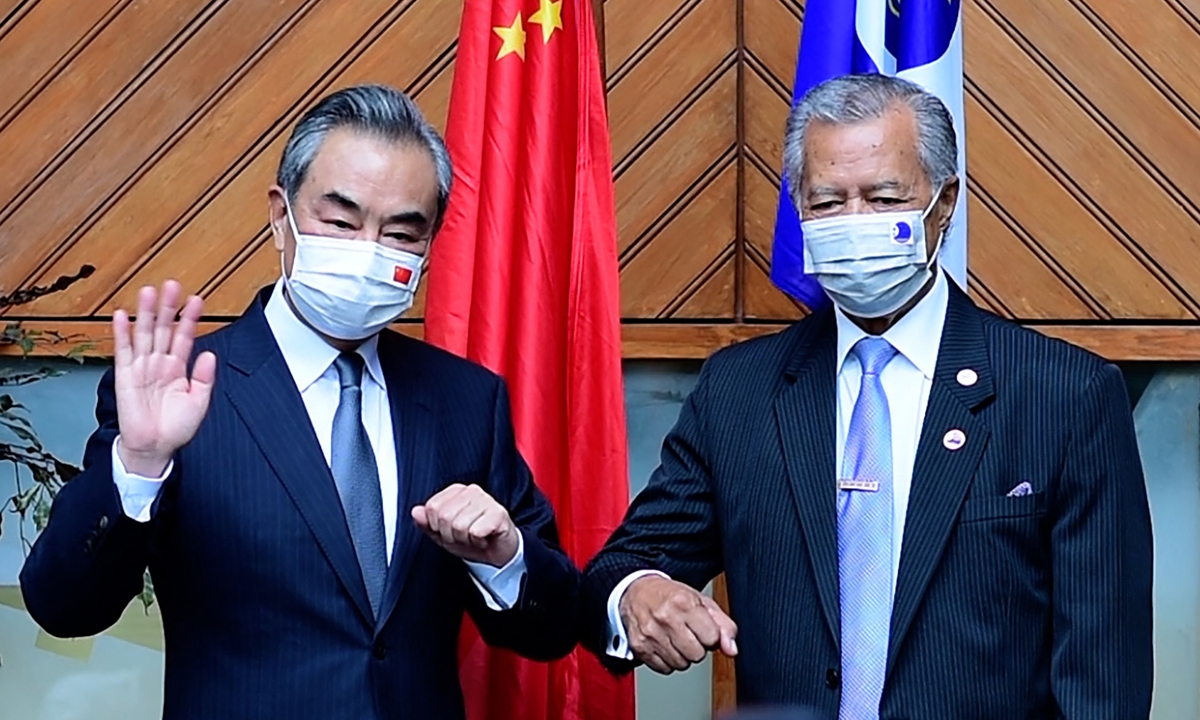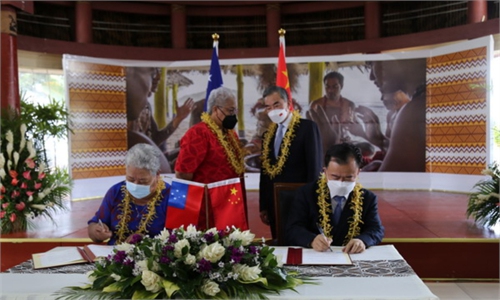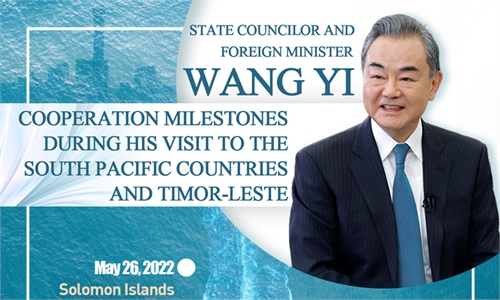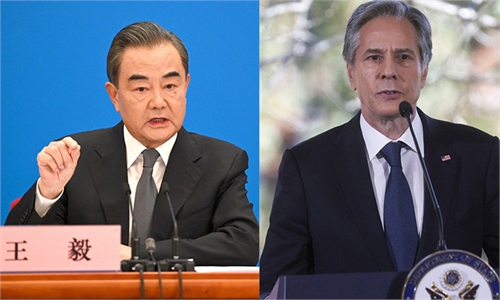Chinese FM visits Fiji; Pacific Island countries ‘won’t be used by anyone to become frontlines of great power competition’
PICs unwilling to be made pawns to serve US, Australia against China: analysts

Chinese State Councilor and Foreign Minister Wang Yi (left) and Secretary-General of the Pacific Islands Forum Henry Puna pose for a picture during their meeting in Suva, capital of Fiji, on May 29, 2022.
Chinese State Councilor and Foreign Minister Wang Yi continued his significant diplomatic activities among the Pacific Island countries (PICs,) and he arrived in Fiji on Sunday in the latest leg of his tour.
Fiji Prime Minister Frank Bainimarama said one day ahead of Wang's visit that "Fiji is not anyone's backyard." Chinese analysts said that Fiji, as a major country in the region, has expressed a common stance shared by other PICs that they do not want to be made use of by major Western powers to serve their containment strategy against China.
Although Bainimarama made the remarks on Saturday after his meeting with visiting Australian foreign minister Penny Wong, he also said, "We are a part of a Pacific family." These words deliver a strong signal that the PICs are independent countries with sovereignty and dignity, and they have the right to develop their ties with China despite pressure from the US and Australia, experts noted.
Wang Yi met with Secretary General of the Pacific Islands Forum Henry Puna in Suva, capital of Fiji, on Sunday. Wang said at the meeting that his trip to the PICs aims at strengthening mutually beneficial cooperation and friendly exchanges with the PICs. "It's a trip for peace, friendship and cooperation."
China's economy is full of energy and new epidemic waves will not stop its development, Wang said. China will firmly promote broader and deeper but higher-level opening-up, and is willing to share its development benefits with the PICs and China welcomes more quality products from Pacific countries to enter the Chinese market, Wang noted.
Puna said that "China is a long standing and important Forum Dialogue Partner, and development partner, to our Blue Pacific region. Recognizing this, we are keen to build on and strengthen our partnership, to progress our Forum Leaders' regional priorities."
"We invite China, and all our international partners, to work with us in taking forward our ambition and determination for a sustainable inclusive future for all our people," Puna said.
The Pacific Islands Forum is a major intergovernmental organization in the region and as its secretariat is located in Fiji, it means Fiji plays a leading role in this organization. The open and welcome attitude expressed by the organization reflects a stance shared by regional countries that they welcome China to boost development and they do not want to be used by others as a frontline for great power competition, experts said.
Before Wang's visit, the US started to make efforts to include Fiji in its new economic framework to serve its unrealistic decoupling strategy with China. Fiji is joining US President Joe Biden's Indo-Pacific Economic Framework (IPEF), the White House said on Thursday, making it the first Pacific Island country in the plan.
Chinese analysts said Fiji so far has not announced or released a statement to confirm the information which was unilaterally released by the US, and that is very interesting.
Chen Hong, director of the Australian Studies Centre at East China Normal University, told the Global Times the IPEF is a plan to push the Indo-Pacific region to decouple from China and push China out of the world supply chain, and the US wants to put the PICs in a significant position to serve its strategy.
"However, to most of the PICs, China is their major trade partner, and political leaders with rationality and political wisdom won't abandon their own interests to decouple from China to serve US hegemony," Chen said. "Whether Fiji joins the IPEF or not, the IPEF would be a hollow and fruitless framework."
Niu Li, executive director of the Pacific Research Center at Beijing Foreign Studies University, told the Global Times that the US and Australia wish to set Fiji as the political leader among South Pacific Island countries to promote their general cooperation with the whole region.
"The remark Fiji's prime minister made that 'Fiji is not anyone's backyard' emphasized the country's diplomatic sovereignty. The Fijian government clearly knows that Australia's foreign minister made the ad hoc visit just one day before Wang Yi's scheduled visit to stop some things from happening between China and Fiji," Niu said. "It is telling the US and Australia that Fiji won't follow your orders to make decisions even if you came before China."
Fiji regards China as a reliable cooperation partner and will not take sides between China and the US, Niu noted.
Just like the diplomatic stance held by the Solomon Islands that it is a "friend with all and enemy with none," Fiji and other PICs with small economies and populations will not be willing to be made pawns to serve other major powers on the chessboard. They wish to remain independent in policymaking and will refuse to take sides in the great power competition, Chen said.
The cooperation between China and the PICs is not targeting or excluding the US and Australia, and China is developing its ties with the PICs based on openness and inclusiveness, which will be welcomed and win support from the PICs' governments and people, Chen noted.
The Chinese Embassy in Fiji refuted on Sunday remarks that China's cooperation draft with Pacific Island countries will affect the sovereignty of the island countries, saying such an understanding is a misinterpretation of China's foreign policy and the China-Pacific comprehensive strategic partnership. Such remarks totally twisted the truth
Such remarks do not represent the mainstream opinions of the Pacific Island countries and may have been instigated and manipulated by Western forces, the Chinese Embassy in Fiji noted.




